TMS Manager Plug-In
The TMS Manager plug-in is used to run the ‘wbTMSMgr’ executable which imports Tray Management System (TMS) tray and pallet scan data into Window Book’s ‘wbDB’ SQL Server database. Use of this plug-in requires access to MS SQL Server. It allows the Client to configure the handling of their physical tray and pallet scan data from their wbScan or Carter Controls TMS.
To configure the TMS Manager plug-in, do the following:
-
Open Scheduler and
 Stop the Service.
Stop the Service. -
Click TMS Manager on the left.
The Select Configuration screen will display.
Select Expert View and click Next to continue.
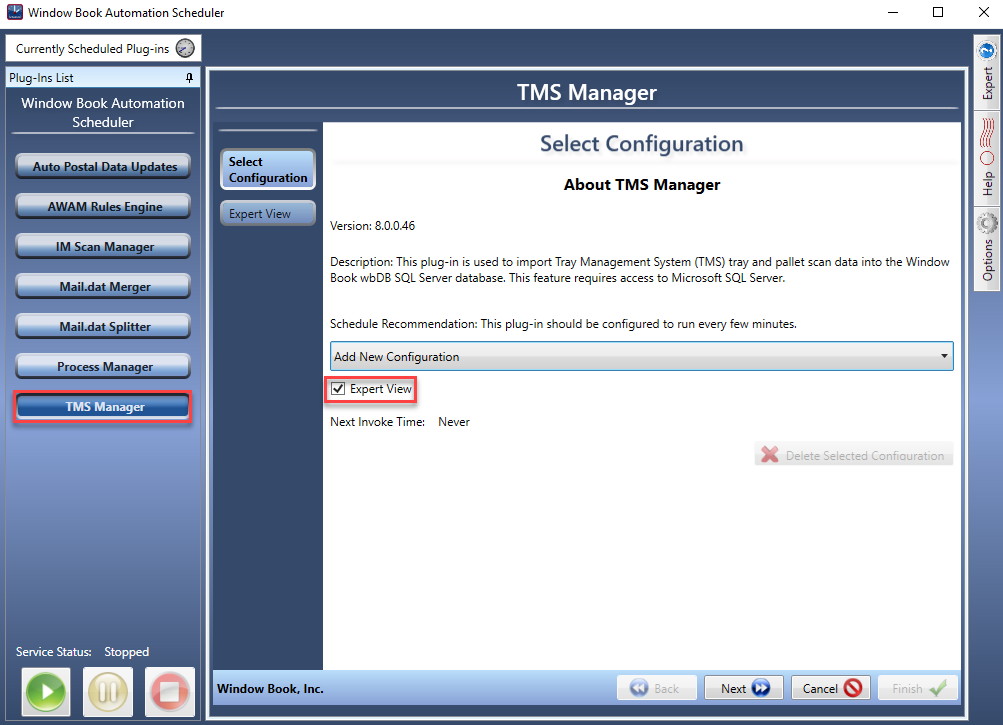
-
The Expert View screen will display. Enter a
 Name specific to the configuration being created and specify when and how often the plug-in’s process will run. Click Next to continue.
Name specific to the configuration being created and specify when and how often the plug-in’s process will run. Click Next to continue.Window Book does not recommend enabling the function to Run at start-up unless directed by a Window Book Support representative. However, if this option is enabled and the Scheduler is stopped and started for whatever reason, the plug-in will run every time the Scheduler starts regardless of the plug-in’s frequency settings.
Below the print screen is an explanation:
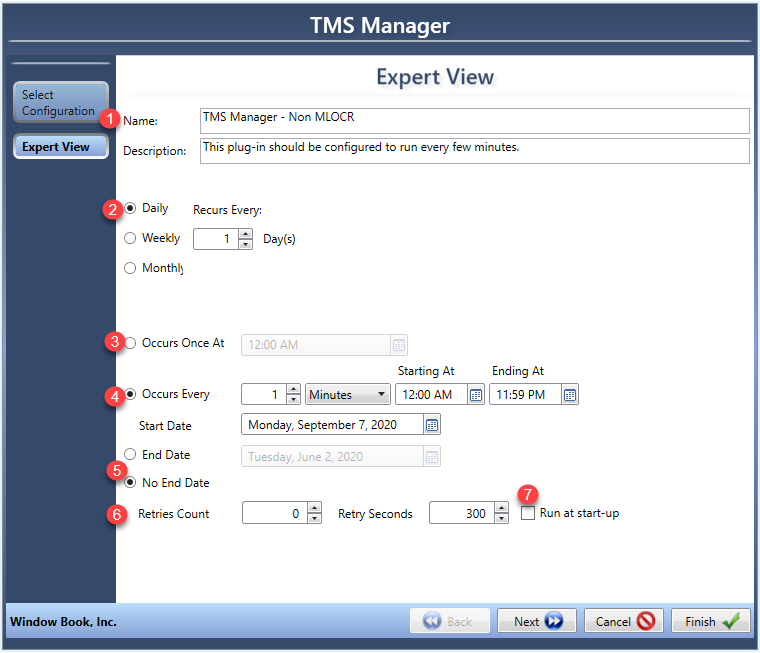
 Recurs every: The default is Daily; leave this setting unless you prefer not to have the Scheduler running every day, then you could change it to Weekly and select the days of the week it should be looking for TMS files.
Recurs every: The default is Daily; leave this setting unless you prefer not to have the Scheduler running every day, then you could change it to Weekly and select the days of the week it should be looking for TMS files. Occurs Once At: If you only want to look for TMS files once a day at a set time, you would select the time here.
Occurs Once At: If you only want to look for TMS files once a day at a set time, you would select the time here. Occurs Every: The default is 5 minutes and the Starting At 12:00 AM and Ending At 11:59 PM. You can adjust to suit your environment. For example, if you run a nightly backup, you change the Starting At and Ending At to ensure the Scheduler is not running.
Occurs Every: The default is 5 minutes and the Starting At 12:00 AM and Ending At 11:59 PM. You can adjust to suit your environment. For example, if you run a nightly backup, you change the Starting At and Ending At to ensure the Scheduler is not running. End Date and No End Date: The default is No End Date. If you are using this configuration for a specific project and after this time you do not want this configuration to run, you could set an End Date.
End Date and No End Date: The default is No End Date. If you are using this configuration for a specific project and after this time you do not want this configuration to run, you could set an End Date.  Retries Count and Retry Seconds: If a user could open a job as a TMS file is picked up, then the processing of the file may error because the job is locked. Also, a virus scan could lock the process.
Retries Count and Retry Seconds: If a user could open a job as a TMS file is picked up, then the processing of the file may error because the job is locked. Also, a virus scan could lock the process. Run at Startup: Never select this option unless a Window Book Support Representative asks you to do so.
Run at Startup: Never select this option unless a Window Book Support Representative asks you to do so. -
The Folders screen will display. Within this screen, you are pointing to the location of the XML (and possible TXT) or CSV, which is referred to here as TMS Import Folder. Also, where to move these files after import (TMS Output Folder). Click Next to continue.
Capstone creates both XML and TXT files. The TXT files are created when there are adjustments to the pallets after the XML file is closed. This file could include removal or addition of trays to pallets, moving trays from one pallet to another or deleting a pallet.
In a server-with-workstations environment, use UNC paths when specifying file folders. In addition, create/use file folders located within a shared and available directory. For example, Window Book recommends creating folders within the main ‘WB’ directory. For assistance with UNC Paths, see the Support Portal Knowledge Base - https://windowbook.na2.teamsupport.com/knowledgeBase (login is required).
The TMS automated notification folder is for a custom program.
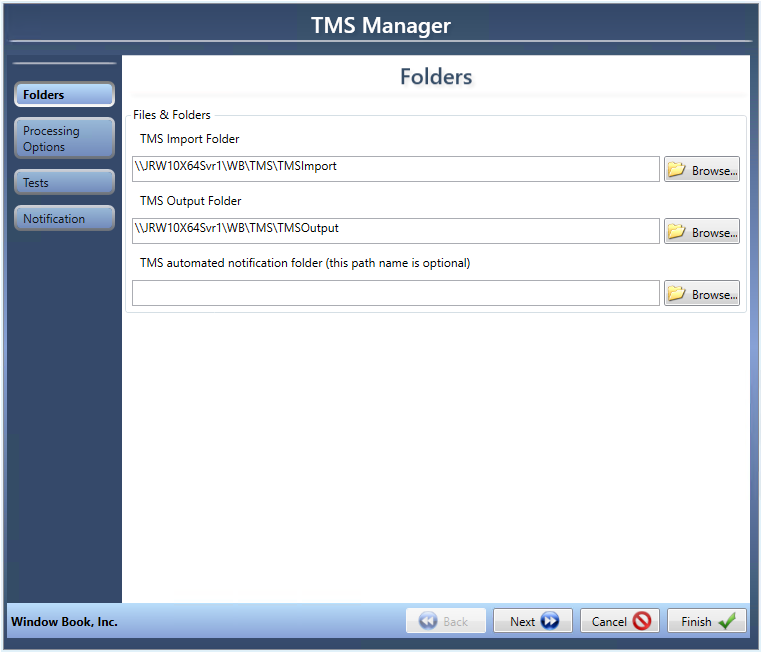
-
The Processing Options screen will display. When ready, click Next to continue.
An explanation of each option or field is shown below the print screen:
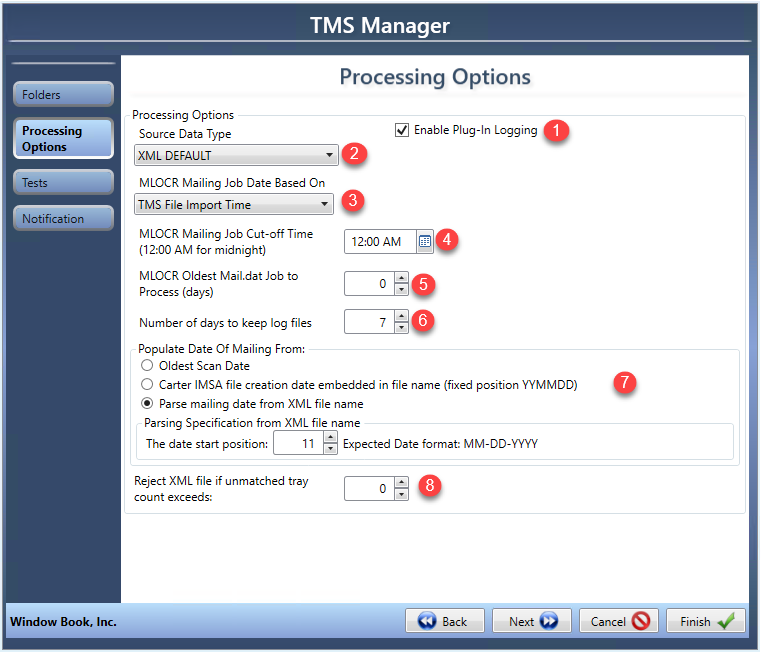
 Enable Plug-In Logging: Select this option to enable message logging to the Window Event log. This option is typically checked for technical support purposes only.
Enable Plug-In Logging: Select this option to enable message logging to the Window Event log. This option is typically checked for technical support purposes only. Source Data Type: Select the source data type from the drop-down list provided:
Source Data Type: Select the source data type from the drop-down list provided: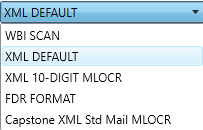
-
WBI Scan: Window Book’s ‘MDScan’ program is generating the container scans.
-
XML Default: Carter Control generates the scan files. This option maps tray scans directly to IMTL barcodes found typically in presort Mail.dat jobs.
-
XML 10-Digit MLOCR: Carter Control generates scan files. This option maps tray scans directly to IMTL barcodes found typically in presort Mail.dat jobs, but if no direct match is found, will attempt to match 10-digit barcode information found in tray scan with 10-digit barcode found in MLOCR Mail.dat jobs.
-
FDR Format: This option maps tray scans directly to IMTL barcodes found typically in presort Mail.dat jobs much like the ‘XML Default’ option; however, the ‘FDR Format’ option uses an XML file that is not generated by and is formatted differently than the XML generated by Carter Control.
-
Capstone XML Std Mail MLOCR: Custom coding project.
Each scan type will require its own TMS Manager plug-in configuration.
 MLOCR Mailing Job Date Based On: How to filter the MLOCR Mail.dat jobs (IMBML records) to find only those MLOCR jobs that should be linked to the tray scans being imported. The mailing job's oldest number of days and job cut-off time values (see below) are used to calculate the earliest and latest mailing dates of MLOCR jobs to include in the TMS scan file processing. Available options are:
MLOCR Mailing Job Date Based On: How to filter the MLOCR Mail.dat jobs (IMBML records) to find only those MLOCR jobs that should be linked to the tray scans being imported. The mailing job's oldest number of days and job cut-off time values (see below) are used to calculate the earliest and latest mailing dates of MLOCR jobs to include in the TMS scan file processing. Available options are: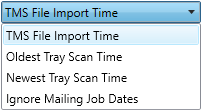
-
TMS File Import Time: The current time the file import is processed is used to calculate the newest date in the filter range.
-
Oldest Tray Scan Time: The oldest tray scan time calculates the latest date in the filter range.
-
Newest Tray Scan Time: The newest tray scan time is used to calculate the latest date in the filter range.
-
Ignore Mailing Job Dates: When this option is selected, the TMS Manager plug-in ignores the CSM container date of mailing when finding MLOCR logical tray records (IMBML records) to link to TMS tray scan records.
 MLOCR Mailing Job Cut-off Time: Used to adjust the newest date (see above) in the MLOCR date filter range. If the calculated most recent time is between midnight and the cut-off time, the latest date used in the date filter is one (1) day before the calculated date. If the cut-off time is between midnight and the calculated newest time, the latest date used is the same day as the calculated date. Specify a time of midnight (12:00 AM) always to include MLOCR records for today’s date, or the oldest or newest scan date, depending upon the job date type selection.
MLOCR Mailing Job Cut-off Time: Used to adjust the newest date (see above) in the MLOCR date filter range. If the calculated most recent time is between midnight and the cut-off time, the latest date used in the date filter is one (1) day before the calculated date. If the cut-off time is between midnight and the calculated newest time, the latest date used is the same day as the calculated date. Specify a time of midnight (12:00 AM) always to include MLOCR records for today’s date, or the oldest or newest scan date, depending upon the job date type selection. MLOCR Oldest Mail.dat Job to Process: Used to calculate the oldest date in the MLOCR date filter range. The specified number of days is subtracted from the calculated newest time to find the earliest date of MLOCR jobs to include in the TMS scan file processing. For example, use 0 days to indicate filtering on only the current day's mailings. Use one (1) day to show filtering on present day's and previous day's mailings.
MLOCR Oldest Mail.dat Job to Process: Used to calculate the oldest date in the MLOCR date filter range. The specified number of days is subtracted from the calculated newest time to find the earliest date of MLOCR jobs to include in the TMS scan file processing. For example, use 0 days to indicate filtering on only the current day's mailings. Use one (1) day to show filtering on present day's and previous day's mailings. Number of days to keep log files: The number of days to retain the message log files generated by the TMS Manager program. Older log files will be deleted each time the plug-in runs, as appropriate.
Number of days to keep log files: The number of days to retain the message log files generated by the TMS Manager program. Older log files will be deleted each time the plug-in runs, as appropriate. Populate Date of Mailing From: Select the radio button for either:
Populate Date of Mailing From: Select the radio button for either:-
Oldest Scan Date: The oldest scan date in the Carter IMSA XML file will populate the Date of Mailing field in the TMS tables.
-
Carter IMSA file Creation Date: The date from the Carter IMSA file name will populate the Date of Mailing field in the TMS tables.
-
-
The Tests screen will display. Select the Run configuration tests the next time plug-in runs checkbox (optional). The test results from the previous test run will display in the Previous Configuration Test Results window. Click Next to continue.
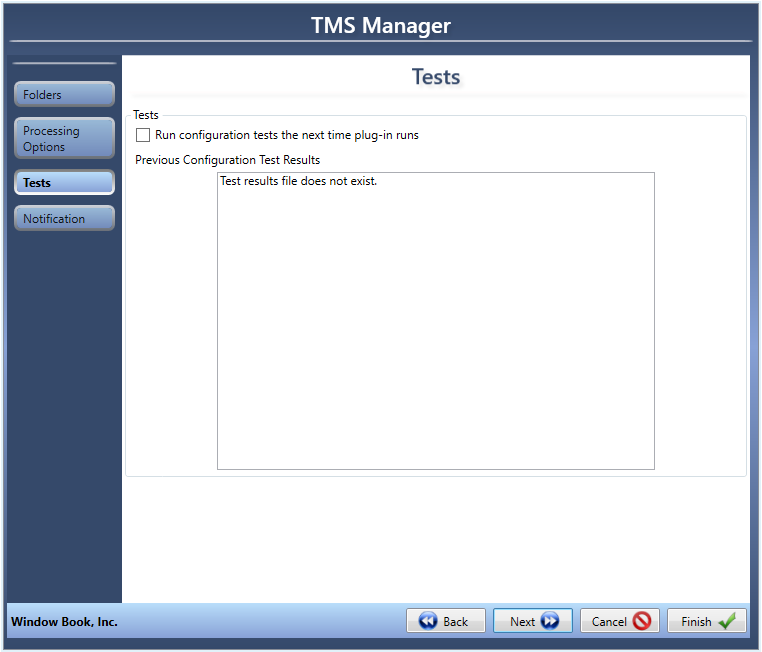
-
The Notification screen will display. Automatic notifications can be sent to a group via email and SMS text messaging when the plug-in runs and the process encounters errors (Send on failure).
The setup and use of the Notification feature require the user to have the necessary information about their Company’s SMTP email server. Consult your Company’s email Administrator to obtain the required SMTP information.
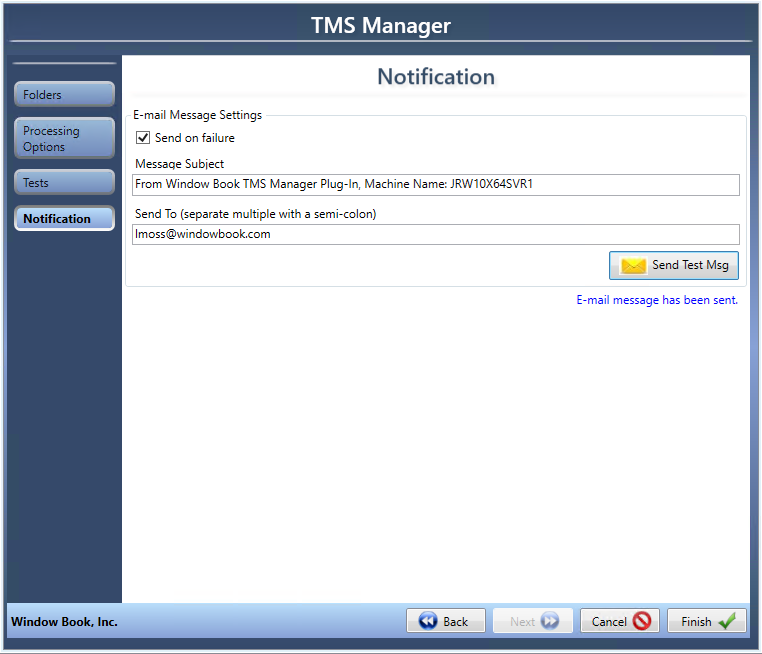
-
Click Finish. The setup and configuration of the TMS Manager plug-in are complete!
If you do not have other plug-ins to set up, click
 Start the service and the Scheduler can be closed.
Start the service and the Scheduler can be closed.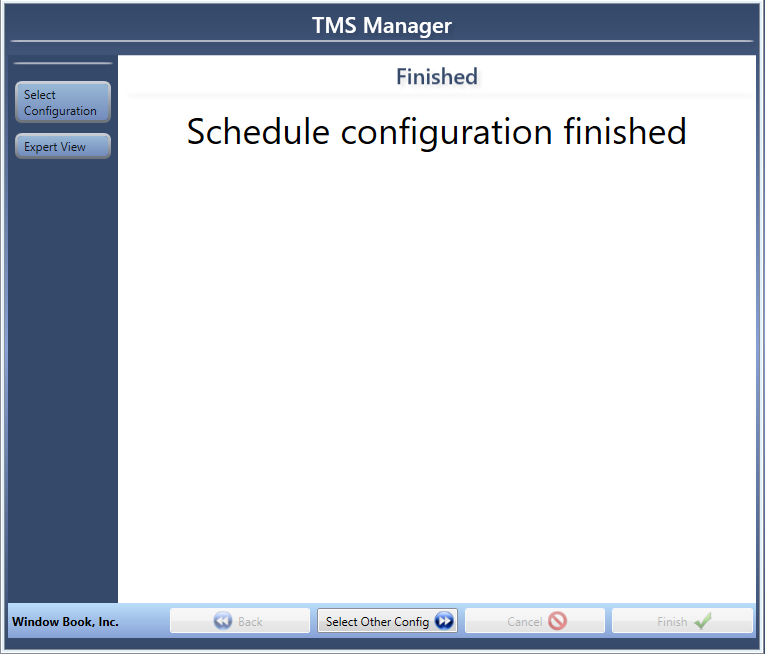
Plug-Ins Available